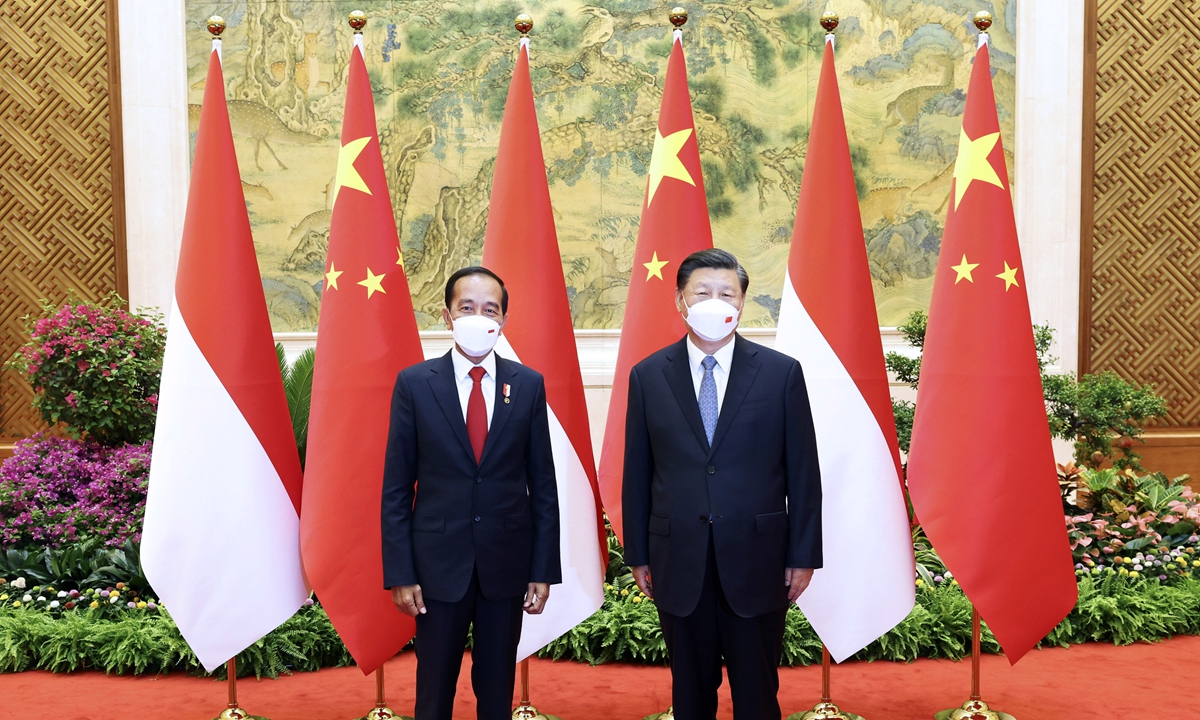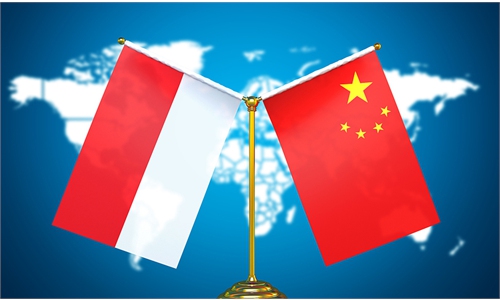China, Indonesia deepen ties, inject stability to region, world in international landscape full of uncertainties

Chinese President Xi Jinping (right) meets with visiting Indonesian President Joko Widodo in Beijing on July 26, 2022. Photo: Xinhua
In a cordial and friendly atmosphere, Chinese President Xi Jinping held talks with Indonesian President Joko Widodo on Tuesday in Beijing, hailing a sound China-Indonesia relationship has positive, far-reaching regional and global impacts and stressing the strong commitment of the two sides to growing their bilateral ties as President Widodo is the first head of state China hosts after the Beijing Olympic Winter Games.
Xi pointed out that strategic mutual trust has been further consolidated, and the four-pillar cooperation, namely political, economic, people-to-people and maritime cooperation, has kept deepening. The two sides have acted proactively and with a strong sense of responsibility to maintain regional peace and stability and promote international unity and cooperation. They have thus set an example of major developing countries seeking strength through unity and win-win cooperation.
"Facts have proven that a sound China-Indonesia relationship not only serves the shared long-term interests of both countries, but also has positive, far-reaching impacts regionally and globally," Xi said.
The Chinese president called on the two sides to further deepen high-quality Belt and Road cooperation for more fruitful outcomes, strive for completing the Jakarta-Bandung high-speed railway on schedule and to high standards, continue to fully support Indonesia in building a regional vaccine production hub, step up public health cooperation with Indonesia and import more commodities and quality agro- and byproducts from Indonesia.
China and Indonesia need to stand together in solidarity, fulfill the responsibilities of major developing countries, follow true multilateralism, uphold open regionalism, and contribute Oriental wisdom and Asia's input to the development of global governance, Xi said.
President Widodo said that in an international landscape full of uncertainties, the sound cooperation between Indonesia and China has demonstrated the strategic nature of the bilateral relations. It adds positive energy to the region and the entire world. Indonesia will work with China to keep deepening their comprehensive strategic partnership and make still greater contribution to regional peace and global development. Indonesia admires China's remarkable accomplishments in poverty alleviation and wants to draw on China's successful experience.
According to a joint statement released after the talks, the two state leaders hailed the two countries' cooperation on fighting COVID-19 and achievements in economic recovery. Indonesia wishes the 20th National Congress of the Communist Party of China a complete success and will lead China toward the second centennial goal of building a great modern socialist country in all respects, while China wishes Indonesia well in achieving its goal of becoming a developed country by 2045, the centenary year of its founding.
The two heads of state agreed to set the general direction of building a China-Indonesia community with a shared future, set an example of mutual benefit, common development and pioneering of South-South cooperation among major developing countries. The two heads of state designated the foreign ministers of the two countries to further discuss the elements and principles of a community with a shared future.
This is Widodo's first trip to East Asia since the onset of the pandemic, and China is the first stop.
Chinese experts believed that the Indonesian president's visit is expected to set the standard for the future development of bilateral relations. At a time when the world is in turmoil, crises are emerging one after another and great power competition is intensifying, strengthening the unity and cooperation between China and Indonesia as major developing countries will also inject stability into an unstable world.
More importantly, given Indonesia is at the presidency of the G20 this year and will be the rotating ASEAN chair next year, the significance of this ongoing visit goes far beyond bilateral ties - it highlights the unity and collaboration of developing countries in offsetting the besiege of the small US-led clique and becoming the stabilizer of the world.
New growth opportunities
In the joint statement, the two state leaders acknowledged mutual achievements and pointed to future direction of cooperation on trade, food security, digital economy, educational exchange, vaccine development and maritime projects.
"Widodo's visit is bound to bring new economic growth opportunities to both countries and even the entire region, including the implementation of new economic projects, so as to further expand the space for economic cooperation," Tang Qifang, an associate research fellow at the China Institute of International Studies, told the Global Times on Tuesday.
In recent years, the mutual political trust between the two countries has reached a new height. The top leaders of the two countries have spoken six times via phone since the COVID-19 outbreak. Economic and trade cooperation has made breakthroughs from quantity to quality. In terms of volume, trade between the two countries has doubled from less than $50 billion to more than $100 billion in the eight years since Widodo took office in 2014. The Belt and Road cooperation is marching toward a higher quality and sustainable development. Additionally, people-to-people and cultural exchanges have become closer.
Despite the impact of COVID-19, the bilateral trade volume between China and Indonesia reached $124.34 billion in 2021, up 58.4 percent year-on-year. China has been Indonesia's largest trading partner for nine consecutive years and its largest export destination for six consecutive years, according to the data from the Chinese customs.
Cooperation between China and Indonesia, the largest and third largest developing countries in the world, will definitely inject more momentum of promoting world peace, a more justified and reasonable international order and the global economic recovery, Xu Liping, a research fellow on Southeast Asian studies at the Chinese Academy of Social Sciences in Beijing, told the Global Times on Tuesday.
More and more facts have proven that China, united with developing countries, has become the stabilizer of the world and the backbone of justice, the expert said.
Luo Yongkun, deputy director of Institute of Southeast Asian and Oceanian Studies at China Institutes of Contemporary International Relations, said that the developed world, mostly Western countries, are into a mind-set of geopolitical containment and confrontation, which bring about only chaos when the world faces challenges. On the contrary, the developing countries, like China and Indonesia, are addressing problems with a perspective of development, growth and multilateralism, injecting more positivity to the world.
During the visit, the two countries renewed the MOU on cooperation on the Belt and Road Initiative and the Global Maritime Fulcrum, and signed cooperation documents on joint research on vaccines and genes, green development, information exchange and law enforcement, cybersecurity capacity building, maritime affairs, and the export of Indonesian pineapples to China.
During the talks, Xi also said China welcomes Indonesia's continued active participation in "BRICS Plus" cooperation and appreciates Indonesia's support for and commitment to the Global Development Initiative and the Global Security Initiative, and is ready for closer communication and cooperation with Indonesia in this regard.
"As the two initiatives are important solutions China proposed to the changing world, including them in China-Indonesia ties shows China's firm support to Indonesia," said Zhang Jie, director of National Institute of International Strategy under the Chinese Academy of Social Sciences.
The fruitful visit will have a strong demonstration effect as the consensus reached and commitments made by the two state leaders can strongly boost market confidence and bring encouragement to Southeast Asian countries, Zhang told the Global Times.
Never give up firm stand
Some Western media have made a lot of "weird" theories about Widodo's visit to China, claiming that the visit is a "dinner party" and reflects the reality of the competition between China and the US for influence in Southeast Asia.
"Widodo's visit is showing to the world that the ASEAN will never give up its firm stand under the pressure of the small US-led clique and their economic and security inducement," Tang said.
Indonesia and other ASEAN members together launched the ASEAN Outlook on the Indo-Pacific, which put forward ASEAN's position of independence from other major powers and insisted on its own interests. This framework envisages ASEAN centrality as the underlying principle for promoting cooperation in the Indo-Pacific region and avoiding the deepening of mistrust, miscalculation, and patterns of behavior based on a zero-sum game, according to the Association of Southeast Asian Nations.
Chinese analysts stressed that the fundamental difference between the model of cooperation between China and Indonesia and other ASEAN members and the Western model is that China does not apply political pressure, but only seeks common interests to carry out mutually beneficial cooperation, so that ASEAN members will feel fully respected.
While the US stirs up confrontation in the name of cooperation, China is earnestly promoting integrated development in the region and the world, they said.
One day ahead of Widodo's visit, a Workshop on the 20th Anniversary of the Declaration on the Conduct of Parties in the South China Sea was held in Beijing on Monday. Officials from China and ASEAN members hailed the DOC as an important landmark document that has played a huge role in maintaining peace and stability in the South China Sea over the past 20 years
Hong Liang, director general of the Department of Border and Ocean Affairs of the Chinese Foreign Ministry, told the Global Times in an exclusive interview that in the face of external challenges, China and ASEAN members have an important consensus that the fate of peace and stability in the South China Sea should be firmly held in their own hands. Only when the South China Sea remains peaceful and stable can countries in the region enjoy a sound environment for development, and that is what the DOC is all about.


